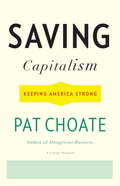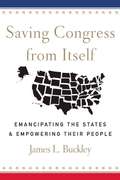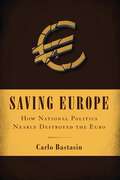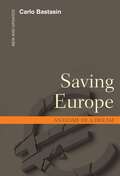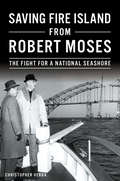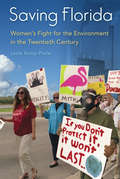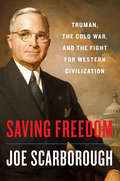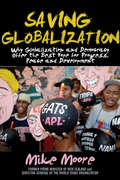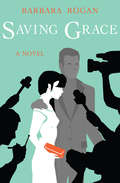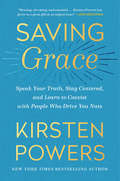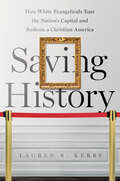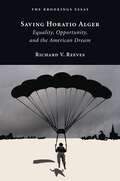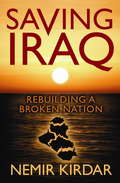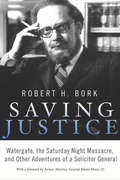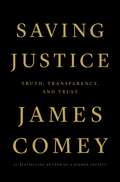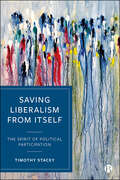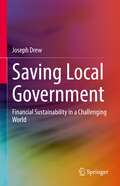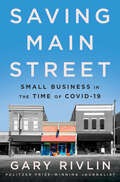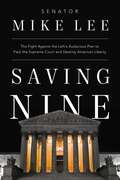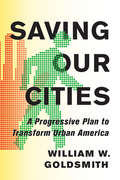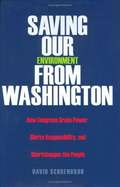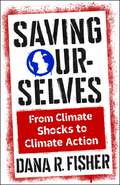- Table View
- List View
Saving Capitalism: Keeping America Strong
by Pat ChoateWhen the U.S. financial structure collapsed in fall 2008, it quickly became clear that our system of market capitalism was broken, endangered by decades of absolutist market dogma, shortsighted policies, and the abandonment of America's working people. Now, as the Obama administration seeks to repair the country's economy, one thing is clear: this crisis calls for drastic reforms. Regrettably, the government's response, so far, has been inadequate.In Saving Capitalism, economist and bestselling author Pat Choate offers six game-changing actions that can strengthen the U.S. economy now and stimulate long-term, self-sustaining, noninflationary economic growth that will create millions of better jobs. Here are proposals for:• Major tax reform• All-encompassing financial regulation• A strong social safety net• A major infrastructure program• Ways and means to balance U.S. trade with the rest of the world• The renewal of national innovationUrgent and provocative, Saving Capitalism is an accessible and informative dissection of the gravest threat our economy has faced since the Great Depression, and a bold and creative blueprint for the future.
Saving Congress from Itself
by James L BuckleySaving Congress from Itself proposes a single reform: eliminate all federal grants-in-aid to state and local governments. This action would reduce federal spending by over $600 billion a year and have a profound effect on how we govern ourselves. The proliferation of federal grants-in-aid programs is of recent vintage: only about 100 such grants existed before Lyndon Johnson took office, and now they number more than 1,100. Eliminating grants to the states will result in enormous savings in federal and state administrative costs; free states to set their own priorities; and improve the design and implementation of programs now subsidized by Washington by eliminating federal regulations that attend the grants. In short, it will free states and their subdivisions to resume full responsibility for all activities that fall within their competence, such as education, welfare, and highway construction and maintenance. And because members of Congress spend major portions of their time creating grants and allocating funds assigned to them (think earmarks), eliminating grants will enable Congress to devote its time to responsibilities that are uniquely national in character.
Saving Europe
by Carlo BastasinThree times in the few years since the global financial crisis erupted, the euro has come close to extinction, endangering both the world economy and history's most ambitious project in shared sovereignty. Yet each time, the case for a common currency proved to be more compelling than its weaknesses, and the euro survived. Saving Europe reveals how the nexus of international economics and national politics pushed monetary union to the brink of a breakup, how that disastrous development was avoided, and why the long-term viability of a common currency challenges politics as we know it.Carlo Bastasin reveals and analyzes what has been happening behind the scenes in European negotiations since the financial crisis began with the collapse of major financial institutions in 2008. He argues that the crisis in the euro zone actually has a political origin, having emerged from the self-interested abuses of national politics. Moreover, the crisis is reinforced even now by the obstinate defense of national prerogatives in politics and finance as well as by the lack of commitment for shared or supranational sovereignty. While the prevalent view is that monetary union was a flawed project from the start and is in need of amending, Bastasin shows that the failures have to do almost entirely with national opportunism-not only in Greece but in most countries, including Germany-and concludes that the crisis will lead to Europe's political union.Bastasin's work is an engrossing historical chronicle, interweaving moments of high drama with individual personalities on the world stage. German ChancellorAngela Merkel, French President Nicolas Sarkozy, and national and European central bankers, among others, play key roles. Saving Europe is also a rigorous attempt to make larger sense of what has happened in the euro zone and what might happen next. Given the central importance of Europe within the fragile world economy as well as growing speculation that the euro might disappear, this is essential reading for anyone trying to grasp international economics and politics. Just as important, it is a compelling tale of people, personalities, power, and money. There is no other book like it.
Saving Europe
by Carlo BastasinIn this gripping narrative, Carlo Bastasin reconstructs the main political decisions of the euro crisis, unveiling the hidden interests and the secret diplomacy behind the scene. The European dream was both the rejection of war and the creation of a new spirit of peaceful cooperation. Yet confrontation has been the hallmark of the euro crisis, and national opportunistic gimmicks have driven the awkward attempts to solve the crisis itself. Today, Europe is in a crisis of democracy, which Bastasin has dubbed, "the first War of Interdependence of the global age." Praise for the first edition of Saving Europe Bastasin does an admirable job in analysing the euro-zone's economic challenges and is a sure-footed guide through the seemingly endless European Union summit meetings that were supposed to resolve them. He also has an eye for the human detail that makes his sad account of institutional muddle surprisingly compelling. - Financial TimesBastasin's book is worth reading for its detailed political narrative of the eurozone crisis to date, focusing on the interaction among decision-makers in Europe's capitals. - Foreign AffairsA reconstruction that may be considered definitive. Revelations on the European negotiations are written with talent and go hand in hand with no-esoteric economic analysis and with the right amount of realism to reach the political substance. -Corriere della SeraAnyone looking for general knowledge and deeper understanding of the crisis, I can recommend a formidable analysis by Carlo Bastasin: Saving Europe. The author is a very unusual combination of a qualified economist and driven journalism. -Svenska Dagbladet
Saving Fire Island from Robert Moses: The Fight for a National Seashore
by Christopher C. VergaSmall coastal communities stand up to the giant of mid-20th century urban development in this chronicle of a true David and Goliath drama. With its unspoiled, tranquil shorelines, Fire Island has been an oasis for vacationers for well over a century. But from the late 1930s into the early 1960s, it was an obsession for Robert Moses, the political power broker and "master builder" who reshaped much of New York. His urban development projects helped create Long Island&’s suburbs, and he dreamed of turning Fire Island into an extension of Ocean Parkway. Standing up to those ambitions were the seventeen individualistic communities of Fire Island, unified in their love for their sun-washed sandy beaches. To maintain a traditional way of life with limited access to motor vehicles, the community began the fight for federal protection through the creation of the Fire Island National Seashore.
Saving Five: A Memoir of Hope
by Amanda Nguyen'Amanda's story underscores the lasting power of speaking your truth, building a movement, and never losing sight of your dreams' Melinda French GatesA brave and imaginative memoir by the Nobel Peace Prize nominee Amanda Nguyen, detailing her healing journey and ground-breaking activism in the aftermath of her rape at Harvard.At a Harvard fraternity party in 2013, the trajectory of Amanda Nguyen's life was changed forever when she was raped.The American-born child of Vietnamese refugees, Nguyen had long dreamed of attending Harvard, and it had become a place of refuge from a childhood filled with turmoil and trauma. Determined to not let her rape derail the life she'd worked so hard to create, she opted for her rape kit to be filed under Jane Doe, knowing that an active court case tied to her name could hurt her odds of working for NASA after graduation, a goal she'd been working toward for years.But she was shocked to learn this choice meant she had only six months to take action before the state of Massachusetts destroyed her kit, rendering any future legal action impossible. Nguyen knew then that she had two options: surrender to a law that effectively silenced survivors of sexual assault, or fight for a change.A deeply affecting memoir of grief, survival, and hope, Saving Five details Nguyen's winding journey of recovery and action, which ultimately led her to create the Sexual Assault Survivors' Bill of Rights, one of the only unanimously passed laws in the history of the United States. Both a tribute to resilience and a lesson on healing, Saving Five is an inspirational story for the ages.
Saving Five: A Memoir of Hope
by Amanda Nguyen'Amanda's story underscores the lasting power of speaking your truth, building a movement, and never losing sight of your dreams' Melinda French GatesA brave and imaginative memoir by the Nobel Peace Prize nominee Amanda Nguyen, detailing her healing journey and ground-breaking activism in the aftermath of her rape at Harvard.At a Harvard fraternity party in 2013, the trajectory of Amanda Nguyen's life was changed forever when she was raped.The American-born child of Vietnamese refugees, Nguyen had long dreamed of attending Harvard, and it had become a place of refuge from a childhood filled with turmoil and trauma. Determined to not let her rape derail the life she'd worked so hard to create, she opted for her rape kit to be filed under Jane Doe, knowing that an active court case tied to her name could hurt her odds of working for NASA after graduation, a goal she'd been working toward for years.But she was shocked to learn this choice meant she had only six months to take action before the state of Massachusetts destroyed her kit, rendering any future legal action impossible. Nguyen knew then that she had two options: surrender to a law that effectively silenced survivors of sexual assault, or fight for a change.A deeply affecting memoir of grief, survival, and hope, Saving Five details Nguyen's winding journey of recovery and action, which ultimately led her to create the Sexual Assault Survivors' Bill of Rights, one of the only unanimously passed laws in the history of the United States. Both a tribute to resilience and a lesson on healing, Saving Five is an inspirational story for the ages.
Saving Florida: Women's Fight for the Environment in the Twentieth Century
by Leslie Kemp PooleIn Saving Florida, Leslie Kemp Poole casts new light on the women at the forefront of Florida’s environmental movement. From creating parks to protesting air pollution, fighting dredge-and-fill operations, and exposing the health dangers of pesticides, these women caused unprecedented changes in how the Sunshine State values its many and marvelous natural resources.At the beginning of the twentieth century women didn’t have the vote, but by the end of the century they were founding issue-specific groups, like Friends of the Everglades, and running state and federal agencies, including the U.S. Environmental Protection Agency. They set the foundation for the next century’s environmental agenda, which came to include the idea of sustainable development, which meshes ecology and economy to enhance energy efficiency and the function of natural systems.This is an indispensable history that not only underscores the importance of women in the environmental movement but also shows how as a collective force they forever altered how others saw women’s roles in society.
Saving Freedom: Truman, the Cold War, and the Fight for Western Civilization
by Joe ScarboroughNEW YORK TIMES BESTSELLER!History called on Harry Truman to unite the Western world against Soviet communism, but first he had to rally Republicans and Democrats behind America’s most dramatic foreign policy shift since George Washington delivered his farewell address. How did one of the least prepared presidents to walk into the Oval Office become one of its most successful?The year was 1947. The Soviet Union had moved from being America’s uneasy ally in the Second World War to its most feared enemy. With Joseph Stalin’s ambitions pushing westward, Turkey was pressured from the east while communist revolutionaries overran Greece. The British Empire was battered from its war with Hitler and suddenly teetering on the brink of financial ruin. Only America could afford to defend freedom in the West, and the effort was spearheaded by a president who hadn’t even been elected to that office. But Truman would wage a domestic political battle that carried with it the highest of stakes, inspiring friends and foes alike to join in his crusade to defend democracy across the globe.In Saving Freedom, Joe Scarborough recounts the historic forces that moved Truman toward his country’s long twilight struggle against Soviet communism, and how this untested president acted decisively to build a lasting coalition that would influence America’s foreign policy for generations to come. On March 12, 1947, Truman delivered an address before a joint session of Congress announcing a policy of containment that would soon become known as the Truman Doctrine. That doctrine pledged that the United States would “support free peoples who are resisting attempted subjugation by armed minorities or by outside pressures.” The untested president’s policy was a radical shift from 150 years of isolationism, but it would prove to be the pivotal moment that guaranteed Western Europe’s freedom, the American Century’s rise, and the eventual collapse of the Soviet Union. Truman’s triumph over the personal and political struggles that confronted him following his ascension to the presidency is an inspiring tale of American leadership, fierce determination, bipartisan unity, and courage in the face of the rising Soviet threat. Saving Freedom explores one of the most pivotal moments of the twentieth century, a turning point when patriotic Americans of both political parties worked together to defeat tyranny.
Saving Globalization
by Mike MooreGlobalization is not new, nor is it a policy, it's a process that has existed as long as man looked over the horizon, travelled and traded. It can't be stopped but it can be slowed. It came to a grinding halt in August 1914 and the Marxist detour cost millions of lives and lost three generations their opportunity and hope in many countries. More wealth has been created in the past 60 years than in all of history. After the most successful decade of sustained economic growth in history, this progress is threatened. Extreme inequality, corruption and environmental degradation threaten the stability and legitimacy of many developing countries' regimes. Anti-globalization and anti-capitalist campaigners' confidence has been emboldened due to the present economic crisis. Protectionist rhetoric is growing as are the arguments to control and regulate markets. Leaders are meeting to discuss how to face these problems and create a new international architecture. How did we get to this position? What should we do? What is it that determines why some contemporary states are successful while others have failed? Saving Globalization departs from its analysis of the globalised economy in the twenty-first century to answer these question by tracing the development of what Moore considers to be 'the big ideas of history': democracy, independent courts, the separation of church and state, property rights, independent courts, a professional civil service, and civil society. Democratic capitalism has worked for most people. Why? It is a remarkable story, from the Greeks to the Geeks, encompassing technological progress and the corrections and contradictions between liberty and equality, technology, growth and the environment. In defence of the many virtues and opportunities that globalisation offers, Mike Moore makes the case for a fresh and new approach to our international Institutions and for domestic policies that promote equity and fairness. The book controversially attacks the new enemies of reason and evidence. The threats now come from all sides, especially workers in developed countries who fear for their jobs. Mike Moore is a political practitioner turned theoretician.
Saving Grace
by Barbara RoganA young woman in New York is caught between her politician father and a manipulative lover in a novel that offers &“sheer enjoyment&” (Library Journal). Jonathan Fleishman has always been perceived as the rarest kind of politician: as idealistic as he was powerful, genuinely committed to the good of the people. For Jonathan, public approbation is the oxygen he breathes; so it is deeply galling that the one person who refuses to see his worth is his own beloved daughter, Grace. When his spotless record is challenged by accusations of corruption leveled by Gracie&’s lover, a ruthless young journalist named Barnaby, Jonathan&’s good life is abruptly shattered. And Grace, faced with the betrayal of a lover who used her to get at her father, comes to realize that neither man is what he seems, even to himself. Saving Grace is an intricately textured book, a portrayal of a family in crisis and an exploration of the intersection between public and private lives. Library Journal called Saving Grace the book that &“Bonfire of the Vanities tried to be.&”
Saving Grace: Speak Your Truth, Stay Centered, and Learn to Coexist with People Who Drive You Nuts
by Kirsten PowersThe CNN senior political analyst and USA Today columnist offers a path to navigating the toxic division in our culture without compromising our convictions and emotional well-being, based on her experience as a journalist during the Trump era, interviews with experts, and research on what leads people to actually change their minds.&“Bracing, elevating, and essential . . . Kirsten Powers has given us a great gift at an urgent hour.&” —Jon MeachamFor years, New York Times bestselling author Kirsten Powers has been center stage for many of our nation&’s most searing political and cultural battles as a columnist, TV analyst, and one-time participant in the thunderdome of Twitter. On a good day, there will be civil disagreement. On a bad day, it&’s all-out trench warfare—nothing but a cycle of outrage and self-righteousness. More and more, Powers finds herself wondering, along with countless Americans: How are we to cope with this non-stop madness?In Saving Grace, Powers writes with wit and insight about our country&’s poisonous political discourse, chronicling the efforts she&’s made to stay grounded and preserve her sanity in a post-truth era that has driven many of us to the edge. She draws on lessons offered by faith leaders, therapists, theologians, social scientists, and activists working for change today. She dismantles the widespread misconception that grace means being nice, letting people get away with harmful behavior, or choosing neutrality in the name of peace. Grace, she argues, is anything but an act of surrender; instead, it is a kinetic and transformative force.Saving Grace offers a template for a different kind of America, one where we can engage with people who hold opposing views without sacrificing our values or our passionate beliefs in the causes we care about. It&’s a culture that embraces repentance and repair, a process through which those who have caused harm can take responsibility and work toward righting the wrongs in which they have participated. It&’s a place where we&’re empowered to see the possibility in other people, even people who are driving us nuts. Provocative, original, and filled with deep wisdom, Saving Grace is an essential read for anyone engaged in the struggle to live compassionately in an era of relentless demonization and division.
Saving History: How White Evangelicals Tour the Nation's Capital and Redeem a Christian America (Where Religion Lives)
by Lauren R. KerbyMillions of tourists visit Washington, D.C., every year, but for some the experience is about much more than sightseeing. Lauren R. Kerby's lively book takes readers onto tour buses and explores the world of Christian heritage tourism. These expeditions visit the same attractions as their secular counterparts—Capitol Hill, the Washington Monument, the war memorials, and much more—but the white evangelicals who flock to the tours are searching for evidence that America was founded as a Christian nation. The tours preach a historical jeremiad that resonates far beyond Washington. White evangelicals across the United States tell stories of the nation's Christian origins, its subsequent fall into moral and spiritual corruption, and its need for repentance and return to founding principles. This vision of American history, Kerby finds, is white evangelicals' most powerful political resource—it allows them to shapeshift between the roles of faithful patriots and persecuted outsiders. In an era when white evangelicals' political commitments baffle many observers, this book offers a key for understanding how they continually reimagine the American story and their own place in it.
Saving Horatio Alger
by Richard V. ReevesTHE BROOKINGS ESSAY: In the spirit of its commitment to high-quality, independent research, the Brookings Institution has commissioned works on major topics of public policy by distinguished authors, including Brookings scholars. The Brookings Essay is a multi-platform product aimed to engage readers in open dialogue and debate. The views expressed, however, are solely those of the author. Available in ebook only.
Saving Iraq: Rebuilding A Broken Nation
by Nemir KirdarNemir Kirdar has lived Iraq's history. From the country of his youth - a stable and vibrant land of great promise, to the 1958 coup that plunged Iraq into a period of terror and destruction, foreign occupation, and the fall of Saddam Hussein, he's been uniquely placed to comment on events and propose solutions.Now Kirdar shares his vision for tomorrow's Iraq, providing a blueprint for political, economic and social renewal. Calling for Iraqis to rise up and unlock their nation's potential, Kirdar affirms that Iraq can again be unified. SAVING IRAQ is a personal account but also a book of global significance, offering steps towards resolution in a shattered country.
Saving Iraq: Rebuilding a Broken Nation
by Nemir KirdarNemir Kirdar has lived Iraq's history. From the country of his youth - a stable and vibrant land of great promise, to the 1958 coup that plunged Iraq into a period of terror and destruction, foreign occupation, and the fall of Saddam Hussein, he's been uniquely placed to comment on events and propose solutions.Now Kirdar shares his vision for tomorrow's Iraq, providing a blueprint for political, economic and social renewal. Calling for Iraqis to rise up and unlock their nation's potential, Kirdar affirms that Iraq can again be unified. SAVING IRAQ is a personal account but also a book of global significance, offering steps towards resolution in a shattered country.
Saving Justice
by Robert H. BorkIn June 1973, Judge Robert Bork was plucked from a quiet life of academia at Yale University and planted in the tumultuous soil of constitutional crisis by a Nixon administration barreling toward collapse. From the ousting of Vice President Spiro Agnew to the discharge of the Watergate special prosecutor, an event known as the Saturday Night Massacre, Saving Justice offers a firsthand, insider account of the whirlwind of events that engulfed the administration during the last half of 1973 and the first few months of 1974. This important volume provides a revelatory look into the inner workings of the Justice Department during some of the most consequential months of the Nixon administration.
Saving Justice: Truth, Transparency, and Trust
by James ComeyJames Comey, former FBI Director and New York Times bestselling author of A Higher Loyalty, uses his long career in federal law enforcement to explore issues of justice and fairness in the US justice system.James Comey might best be known as the FBI director that Donald Trump fired in 2017, but he’s had a long, varied career in the law and justice system. He knows better than most just what a force for good the US justice system can be, and how far afield it has strayed during the Trump Presidency. In his much-anticipated follow-up to A Higher Loyalty, Comey uses anecdotes and lessons from his career to show how the federal justice system works. From prosecuting mobsters as an Assistant US Attorney in the Southern District of New York in the 1980s to grappling with the legalities of anti-terrorism work as the Deputy Attorney General in the early 2000s to, of course, his tumultuous stint as FBI director beginning in 2013, Comey shows just how essential it is to pursue the primacy of truth for federal law enforcement. Saving Justice is gracefully written and honestly told, a clarion call for a return to fairness and equity in the law.
Saving Liberalism from Itself: The Spirit of Political Participation
by Timothy StaceyIn the wake of populism, Timothy Stacey’s book critically reflects on what is missing from the liberal project with the aim of saving liberalism. It explains that populists have harnessed myth, ritual, magic and tradition to advance their ambitions, and why opponents need to embrace rather than eschew them. Using examples of liberally oriented activists in Vancouver, it presents an accessible theorization of these quasi-religious concepts in secular life. The result is to provide both a new theoretical understanding of why liberalism fails to engage people, and a toolkit for campaigners, policymakers and academics seeking to bridge the gap between liberal aspirations and lived experiences, in order to promote political engagement and to create unity out of division.
Saving Local Government: Financial Sustainability in a Challenging World
by Joseph DrewThis book focuses squarely on the problem of saving local government in the context of extraordinary financial challenges being faced across the globe. Saving Local Government is written principally for practitioners and employs a ‘conversational’ tone which makes complex theory both engaging and accessible. It augments world-best scholarship with Professor Joseph Drew’s extensive practical experience in guiding local governments away from the brink of financial insolvency. It is thus a ‘must read’ for local government executives, Mayors, Councillors and the regulators that oversee the sector.In Saving Local Government Professor Drew also makes a number of important contributions to address significant gaps in the scholarly literature. In particular, the book includes extensive treatment of de-amalgamation, applied natural law philosophy, Aristotelian epistemology for evaluating public policy success, as well as alternatives to financial administration. The work is therefore also compelling reading for scholars.
Saving Main Street: Small Business in the Time of COVID-19
by Gary RivlinA veteran journalist follows an inspiring ensemble cast of small business owners fighting to keep their businesses alive through Covid-19, while exploring the sweeping trends and government policies that had brought small businesses to the breaking point long before the coronavirus hit.There is a tendency to fetishize small business even as it shrinks before our eyes. Americans extol the virtues of small, local, often family-run shops, yet buy from big-box retailers and chains that dominate the competition. Even before the pandemic, small businesses seemed endangered. When Covid-19 hit, the resounding question was: How will they be able to survive this?Saving Main Street is an unfiltered, up-close examination of a small group of business owners and their employees, their struggles, and their strategies to survive. It is an eye-opening tale of grit, perseverance, and entrepreneurial spirit that follows three businesses: a restaurant owner and his rambunctious staff, an immigrant running her own hair salon, and the owner of a “non-life sustaining” gift shop—alongside a larger cast of vividly drawn characters. Gary Rivlin focuses on the first days of the Covid lockdown and the ensuing eighteen months of chaos, including the personal and financial risks, a contentious presidential election, and contradictory governmental guidelines—all which compounded the everyday challenges of running an independent business trying to attract and retain customers who expect low prices, convenience, and endless choice. Rivlin keenly observes small businesses from all angles, examining commonly held “myths”; contradictions in government policy; enormous racial and class fissures; a national self-identity intrinsically connected to the ideal of small business, and how the decline of this American way of retail impacts our notions of American exceptionalism, community, and civic duty.As Rivlin reveals, there’s something enduring about small business in the American psyche. Life will have changed in unprecedented ways on the other side of this pandemic, yet hard times will also create opportunities, offering hope and survival.
Saving Nine: The Fight Against the Left's Audacious Plan to Pack the Supreme Court and Destroy American Liberty
by Mike LeeIn this national bestseller praised by Mark Levin and Sean Hannity, a leading conservative senator explains how the left&’s partisan push to pack the Supreme Court with liberal justices has fully migrated from the fringes into the mainstream of Democratic politics. It wasn&’t long ago that liberal icons, including the late Supreme Court Justice Ruth Bader Ginsburg, were against the idea of overhauling the court for political gain. But now, in the Biden era, more and more powerful Democrats are getting behind the cause, claiming the high court is broken and actively dismantling our democracy. Even Joe Biden—who once called court-packing a &“bonehead idea&”—gave in to the progressive wing of his party, appointing a committee to examine &“reforms&” to the court after being sworn in as president. In Saving Nine, Mike Lee, a brilliant legal mind, details the history of the current composition of the Supreme Court and strongly warns against the norm-shattering precedent that would be set by politically motivated attempts to turn the Supreme Court into just another partisan weapon.
Saving Our Cities: A Progressive Plan to Transform Urban America
by William W. GoldsmithIn Saving Our Cities, William W. Goldsmith shows how cities can be places of opportunity rather than places with problems. With strongly revived cities and suburbs, working as places that serve all their residents, metropolitan areas will thrive, thus making the national economy more productive, the environment better protected, the citizenry better educated, and the society more reflective, sensitive, and humane.Goldsmith argues that America has been in the habit of abusing its cities and their poorest suburbs, which are always the first to be blamed for society's ills and the last to be helped. As federal and state budgets, regulations, and programs line up with the interests of giant corporations and privileged citizens, they impose austerity on cities, shortchange public schools, make it hard to get nutritious food, and inflict the drug war on unlucky neighborhoods.Frustration with inequality is spreading. Parents and teachers call persistently for improvements in public schooling, and education experiments abound. Nutrition indicators have begun to improve, as rising health costs and epidemic obesity have led to widespread attention to food. The futility of the drug war and the high costs of unwarranted, unprecedented prison growth have become clear. Goldsmith documents a positive development: progressive politicians in many cities and some states are proposing far-reaching improvements, supported by advocacy groups that form powerful voting blocs, ensuring that Congress takes notice. When more cities forcefully demand enlightened federal and state action on these four interrelated problems—inequality, schools, food, and the drug war—positive movement will occur in traditional urban planning as well, so as to meet the needs of most residents for improved housing, better transportation, and enhanced public spaces.<
Saving Our Environment from Washington: How Congress Grabs Power, Shirks Responsibility, and Shortchanges the People
by David SchoenbrodCongress empowered the Environmental Protection Agency on the theory that only a national agency that is insulated from accountability to voters could produce the scientifically grounded pollution rules needed to save a careless public from its own filth. In this provocative book, David Schoenbrod explains how his experience as an environmental advocate brought him to this startling realization: letting EPA dictate to the nation is a mistake. Through a series of gripping and illuminating anecdotes from his own career, the author reveals the EPA to be an agency that, under Democrats and Republicans alike, delays good rules, imposes bad ones, and is so big, muscle-bound, and remote that it does unnecessary damage to our society. EPA stays in power, he says, because it enables elected legislators to evade responsibility by hiding behind appointed bureaucrats. The best environmental rules-those that have done the most good-have come when Congress had to take responsibility or from states and localities rather than the EPA. With the passion of an authentic environmentalist, Schoenbrod makes a sensible plea for "bottom-up" environmental protection now. The responsibility for pollution control belongs not in agencies but in legislatures, and usually not at the federal level but rather closer to home.
Saving Ourselves: From Climate Shocks to Climate Action (Society and the Environment)
by Dana R. FisherWe've known for decades that climate change is an existential crisis. For just as long, we've seen the complete failure of our institutions to rise to the challenge. Governments have struggled to meet even modest goals. Fossil fuel interests maintain a stranglehold on political and economic power. Even though we have seen growing concern from everyday people, civil society has succeeded only in pressuring decision makers to adopt watered-down policies. All the while, the climate crisis worsens. Is there any hope of achieving the systemic change we need?Dana R. Fisher argues that there is a realistic path forward for climate action—but only through mass mobilization that responds to the growing severity and frequency of disastrous events. She assesses the current state of affairs and shows why public policy and private-sector efforts have been ineffective. Spurred by this lack of progress, climate activism has become increasingly confrontational. Fisher examines the radical flank of the climate movement: its emergence and growth, its use of direct action, and how it might evolve as the climate crisis worsens. She considers when and how activism is most successful, identifying the importance of creating community, capitalizing on shocking moments, and cultivating resilience. Clear-eyed yet optimistic, Saving Ourselves offers timely insights on how social movements can take power back from deeply entrenched interests and open windows of opportunity for transformative climate action.
